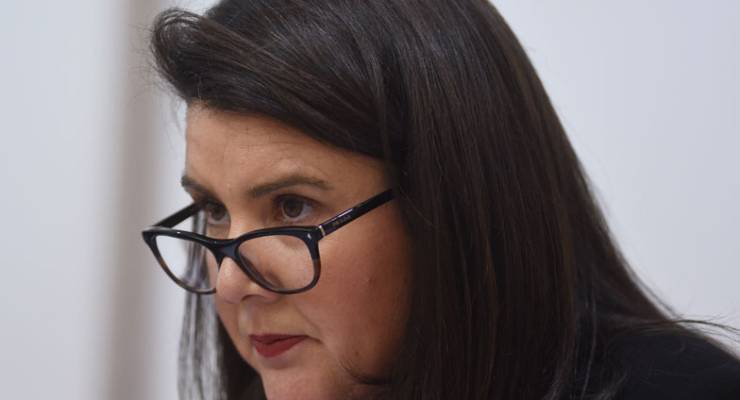
When Senator Jane Hume gave her maiden speech in August, she described herself as a relative unknown in Canberra.
“I do not come to this place with political pedigree nor a reputation that precedes me,” the newbie Senator said. “I have no media profile. I have never worked at a think tank.”
She described herself as a proud “economic hardhead”, and spent much of her speech talking about the need for government to spend money wisely and lauding the efforts of female trailblazers in the Liberal Party. In other words, she said nothing particularly interesting.
But after her performance at yesterday’s Senate estimates, her profile has risen. The ABC’s estimates are some of the most closely watched in Canberra, both because of the large number of journalists who tune in and because of the sheer entertainment value of seeing Eric Abetz ask baffled ABC executives why Aunty didn’t cover the recent conservative victory in the Polish election more prominently. In front of this wide audience yesterday, Hume, a 20-year finance veteran most recently employed in the union-owned industry super industry, tore strips off the ABC’s most senior executives. The efforts of her work made today’s Australian front page.
Monday’s Four Corners, reported by Debbie Whitmont, told the experiences of several children who had been released into the Nauruan community over the past three years. They spoke of violent tensions with the local community, poor facilities and disruptions to schooling. The program also interviewed those who had worked on Nauru, including staff from Amnesty International and Save the Children. It prompted a fierce, though not uncharacteristic, denial from the government of Nauru the morning after.
By the afternoon, Hume’s briefing on the issue was thorough. In intense, sustained questioning of the ABC, she asked:
- How the ABC could be sure the material filmed on Nauru wasn’t “orchestrated”, given it was likely filmed by Amnesty International and Save the Children (the ABC relied on footage shot at its directions by others who could go to the island nation, given it hasn’t been able to secure visas in the past — it hasn’t said who shot the footage);
- Whether the program was representative of the total experience of children on Nauru (“You didn’t interview every child,” she said), and thus whether it was balanced;
- Why, given ABC Fact Check had concluded that whistleblower laws apply extraterritoriality, the program claimed those who spoke to it were at risk of prosecution;
- Whether the ABC had rejected a live interview with the Minister for Border Protection, and she said an offer to have a departmental staff member answer questions about the children featured in the program had been rejected;
- Why the ABC hadn’t approached the government of Nauru, and why the program had shown footage of a disused hospital and school — she said footage of the current school and hospital had been offered to the ABC but not used;
- Why the ABC didn’t raise the experience of 20 asylum seekers studying through the University of the South Pacific; and
- Whether it was a “coincidence” that an Amnesty International report on conditions on Nauru had been released the moment the program went to air.
Hume wanted an inquiry into the program, though not of the kind Four Corners usually sparks. ABC director of editorial policy Alan Sunderland said he saw no reason for the ABC to investigate. “We don’t launch inquiries into excellent pieces of journalism,” he said.
He had answers for the vast majority of Hume’s questions, repeatedly pointing out that the reason the ABC relied on footage filmed by others was because it wasn’t allowed on Nauru. This meant it was harder to check claims made, like the existence of a new hospital and school. The footage and testimony gathered was subjected to Four Corners‘ vigorous fact-checking, he said, and he had no reason to doubt it. Those interviewed were those with stories to tell. The program, he said, wasn’t intended to be an objective survey of the experiences of all children, but to highlight stories that needed to be told.
“I think what the story needed to do last night was what it did do,” he said, to which Hume remarked that then the program was “selective”. “Not in an inappropriate way,” Sunderland responded. He had no concerns about the program’s balance. “The program was accurate, it was well researched, it was well produced and it told a very compelling story.”
Hume didn’t appear mollified. Her questioning ended with an insistence that the ABC take note of her questions as a formal complaint against the program. We’ll let you know how that goes.








Crikey is committed to hosting lively discussions. Help us keep the conversation useful, interesting and welcoming. We aim to publish comments quickly in the interest of promoting robust conversation, but we’re a small team and we deploy filters to protect against legal risk. Occasionally your comment may be held up while we review, but we’re working as fast as we can to keep the conversation rolling.
The Crikey comment section is members-only content. Please subscribe to leave a comment.
The Crikey comment section is members-only content. Please login to leave a comment.